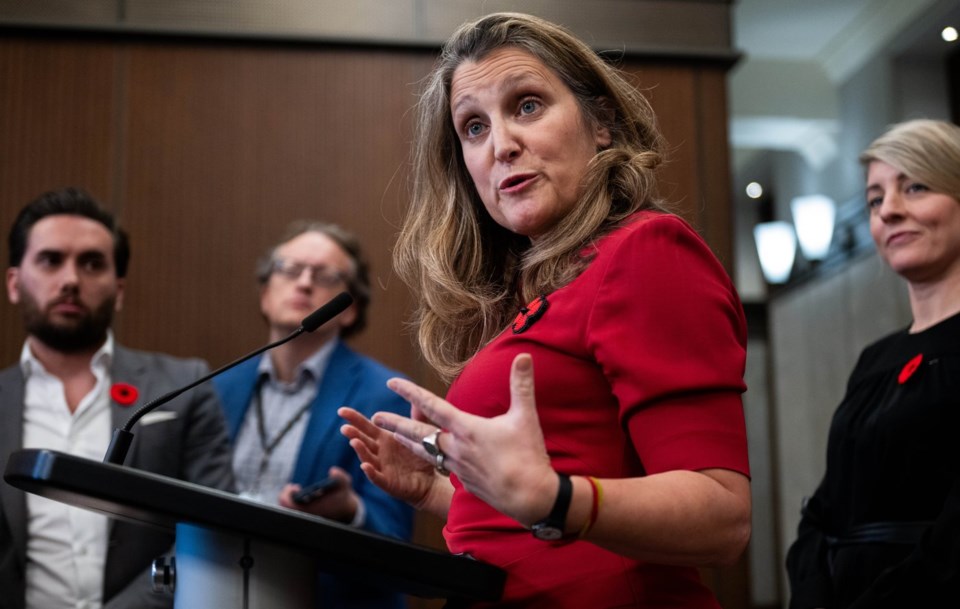OTTAWA — Deputy Prime Minister Chrystia Freeland is getting the band back together, seeking to rally a united front and co-ordinate a plan to deal with threats posed by the incoming Donald Trump presidency.
She’s spending her days talking with heads of major industries and various premiers and meeting with members of parties across the political spectrum, mirroring efforts by her government the last time a Trump White House threatened Canada’s national interests.
"We're going to need to take a real Team Canada approach on all of these issues," she said at a Friday news conference, following the first meeting of a rejuvenated cabinet committee on Canada-U.S. relations.
She and Foreign Affairs Minister Mélanie Joly got up in front of the TV cameras seeking to reassure the public that Canada will be ready and the nation can pull through another white-knuckle ride with Trump in the Oval Office.
The committee was created by Prime Minister Justin Trudeau after Trump took office the first time in 2017. It went dormant during President Joe Biden's term but was revived a little more than 24 hours after Trump's win was secured.
Speaking in В鶹ҙ«ГҪУі»ӯFriday, Trudeau said his government's job will be making sure Trump and his allies know that his policies to protect American jobs can be done in partnership with Canada.
"The Canada-U.S. Committee is a sign that we are ready to tackle some of the new challenges that no doubt the new American administration will put on the table for countries around the world, that Canada will be ready to handle," he said.
The cabinet has wasted no time jumping in with both feet, even though Trump's second inauguration is still more than two months away.
Freeland’s schedule has been packed with meetings, set up following the Trump victory, with auto-parts manufacturers and steel companies, leaders of Canada’s largest banks and major pension funds. On Saturday it’s Alberta’s oil and gas sector, and next week it’s organized labour groups.
When Canada was locked in trade renegotiations with Trump 1.0, former Conservative leader Rona Ambrose and the late Brian Mulroney were enlisted to help play key roles as trade with Canada came under fire from a self-styled deal-maker president who had campaigned on tearing up NAFTA.
For her part, Joly said she has been reaching out to "many key influencers within the Trump administration" and U.S. Senators to advocate for Canadian interests.
The Canada-U.S. committee is made up of senior ministers co-ordinating Canada's new U.S. strategy, including Public Safety Minister Dominic LeBlanc and Immigration Minister Marc Miller, with trade and the border being the two biggest concerns.
Trump campaigned this past year on imposing across-the-board tariffs on U.S. imports and deporting millions of illegal immigrants. That's stoked fears that his second term in the White House could deal a blow to the Canadian economy and cause a sudden influx of migrants at the border.
Freeland said she is not yet ready to disclose anything about the plan the cabinet committee is discussing.
Trudeau said the message for the U.S. is that imposing tariffs on Canada will backfire. He said the fact the two countries are completely intertwined on supply chains "means that tariffs or thickening of the border between Canada and the U.S. will inevitably hurt American workers. American jobs as well."
The last time Ottawa grappled with Trump in a major trade fight was over steel and aluminum tariffs some seven years ago, and Freeland said Canada won out in the end.
She boasted about working the phone with Robert Lighthizer, Trump’s former U.S. Trade Representative, saying she’s been in "really frequent" contact with him this week and met with him in person over the summer.
The Financial Times newspaper reported Friday Lighthizer has been asked to return to that role in the new Trump cabinet.
Freeland dealt frequently with Lighthizer over Trump’s steel and aluminum tariffs and the NAFTA renegotiations that produced a revamped trilateral trade pact, the United States-Mexico-Canada Agreement — which she now points to as reason to be reassured about Canada’s current position.
"What's important about that whole experience is that Canada and the United States agreed, at the end of the day, that it didn't make sense for our two countries to have those tariffs imposed, and it was Ambassador Lighthizer with whom I did a deal."
Freeland also pointed to her meetings in Hamilton with the steel industry as she sought to assuage anxious Canadians.
She said Trump-backer Lourenco Goncalves, who owns the U.S. firm Cleveland-Cliffs Inc. that acquired Stelco, expressed "real confidence" the Canada-U.S. trade relationship will endure.
"So just think about this for a minute: a significant Trump supporter, a significant U.S. steel producer has made the decision to acquire a Canadian steelmaker, which depends very significantly on Canadian steel exports to the United States."
This report by The Canadian Press was first published Nov. 8, 2024.
Kyle Duggan, The Canadian Press



